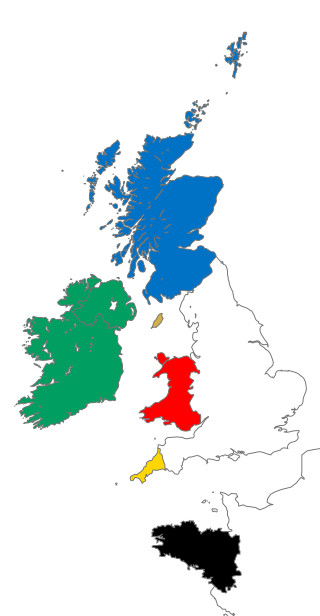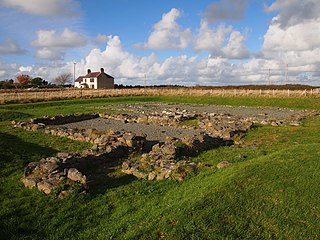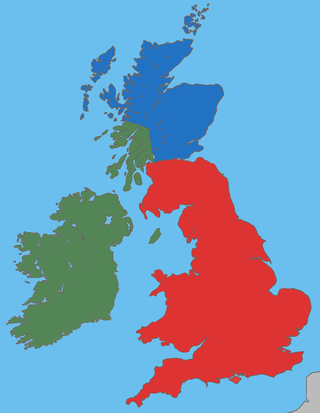Related Research Articles

The Celtic languages are a group of related languages descended from Proto-Celtic. They form a branch of the Indo-European language family. The term "Celtic" was first used to describe this language group by Edward Lhuyd in 1707, following Paul-Yves Pezron, who made the explicit link between the Celts described by classical writers and the Welsh and Breton languages.

The Celts or Celtic peoples were a collection of Indo-European peoples in Europe and Anatolia, identified by their use of Celtic languages and other cultural similarities. Major Celtic groups included the Gauls; the Celtiberians and Gallaeci of Iberia; the Britons and Gaels of Britain and Ireland; the Boii; and the Galatians. The relation between ethnicity, language and culture in the Celtic world is unclear and debated; for example over the ways in which the Iron Age people of Britain and Ireland should be called Celts. In current scholarship, 'Celt' primarily refers to 'speakers of Celtic languages' rather than to a single ethnic group.

Sir Barrington Windsor Cunliffe,, known as Barry Cunliffe, is a British archaeologist and academic. He was Professor of European Archaeology at the University of Oxford from 1972 to 2007. Since 2007, he has been an emeritus professor.

Atlantic Europe is a geographical term for the western portion of Europe which borders the Atlantic Ocean. The term may refer to the idea of Atlantic Europe as a cultural unit and/or as a biogeographical region.
The modern Celts are a related group of ethnicities who share similar Celtic languages, cultures and artistic histories, and who live in or descend from one of the regions on the western extremities of Europe populated by the Celts.

Pan-Celticism, also known as Celticism or Celtic nationalism is a political, social and cultural movement advocating solidarity and cooperation between Celtic nations and the modern Celts in Northwestern Europe. Some pan-Celtic organisations advocate the Celtic nations seceding from the United Kingdom and France and forming their own separate federal state together, while others simply advocate very close cooperation between independent sovereign Celtic nations, in the form of Breton, Cornish, Irish, Manx, Scottish, and Welsh nationalism.

Ancient Celtic religion, commonly known as Celtic paganism, was the religion of the ancient Celtic peoples of Europe. Because there are no extant native records of their beliefs, evidence about their religion is gleaned from archaeology, Greco-Roman accounts, and literature from the early Christian period. Celtic paganism was one of a larger group of polytheistic Indo-European religions of Iron Age Europe.

The Britons, also known as Celtic Britons or Ancient Britons, were an indigenous Celtic people who inhabited Great Britain from at least the British Iron Age until the High Middle Ages, at which point they diverged into the Welsh, Cornish, and Bretons. They spoke Common Brittonic, the ancestor of the modern Brittonic languages.

Celtic studies or Celtology is the academic discipline occupied with the study of any sort of cultural output relating to the Celtic-speaking peoples. This ranges from linguistics, literature and art history, archaeology and history, the focus lying on the study of the various Celtic languages, living and extinct. The primary areas of focus are the six Celtic languages currently in use: Irish, Scottish Gaelic, Manx, Welsh, Cornish, and Breton.

The Celtic nations or Celtic countries are a cultural area and collection of geographical regions in Northwestern Europe where the Celtic languages and cultural traits have survived. The term nation is used in its original sense to mean a people who share a common identity and culture and are identified with a traditional territory.

The Atlantic Bronze Age refers to a cultural complex of the Bronze Age period in prehistoric Europe, spanning approximately 1300–700 BC. This complex includes various cultures in Britain, France, Ireland, Portugal and Spain.

Llys Rhosyr, also known as "Cae Llys", is an archaeological site near Newborough in Anglesey; the ruins of a pre-Edwardian commotal court.
Miranda Jane Aldhouse-Green, is a British archaeologist and academic, known for her research on the Iron Age and the Celts. She was Professor of Archaeology at Cardiff University from 2006 to 2013. Until about 2000 she published as Miranda Green or Miranda J. Green.

Bronze Age Britain is an era of British history that spanned from c. 2500–2000 BC until c. 800 BC. Lasting for approximately 1,700 years, it was preceded by the era of Neolithic Britain and was in turn followed by the period of Iron Age Britain. Being categorised as the Bronze Age, it was marked by the use of copper and then bronze by the prehistoric Britons, who used such metals to fashion tools. Great Britain in the Bronze Age also saw the widespread adoption of agriculture.
Howard M. R. Williams is a British archaeologist and academic who is Professor of Archaeology at the University of Chester in England. His research focuses on the study of death, burial and memory in Early Medieval Britain.
John T. Koch is an American academic, historian, and linguist who specializes in Celtic studies, especially prehistory, and the early Middle Ages. He is the editor of the five-volume Celtic Culture: A Historical Encyclopedia. He is perhaps best known as the leading proponent of the Celtic from the West hypothesis.

The Insular Celts were speakers of the Insular Celtic languages in the British Isles and Brittany. The term is mostly used for the Celtic peoples of the isles up until the early Middle Ages, covering the British–Irish Iron Age, Roman Britain and Sub-Roman Britain. They included the Celtic Britons, the Picts, and the Gaels.

Celtic mythology is the body of myths belonging to the Celtic peoples. Like other Iron Age Europeans, Celtic peoples followed a polytheistic religion, having many gods and goddesses. The mythologies of continental Celtic peoples, such as the Gauls and Celtiberians, did not survive their conquest by the Roman Empire, the loss of their Celtic languages and their subsequent conversion to Christianity. Only remnants are found in Greco-Roman sources and archaeology. Most surviving Celtic mythology belongs to the Insular Celtic peoples. They preserved some of their myths in oral lore, which were eventually written down by Christian scribes in the Middle Ages. Irish mythology has the largest written body of myths, followed by Welsh mythology.
Nancy Margaret Edwards, is a British archaeologist and academic, who specialises in medieval archaeology and ecclesiastical history. From 2008 to 2020, she was Professor of Medieval Archaeology at Bangor University; having retired, she is now emeritus professor.

The Celts is a 2000 television documentary series produced by Opus Television for the Welsh channel S4C. A book adaptation of the same name by John Davies was published in the same year by Cassell & Co. Also in that year, the programme was sold to the American cable network Celtic Vision.
References
- 1 2 "Profile of Dr. Raimund Karl". Bangor University. Retrieved 21 April 2012.
- ↑ Karl, Raimund. "Homepage of Karl, Raimund". University of Vienna.
- 1 2 3 Karl, Raimund. "Discovering the archaeologists of Europe" (PDF). Internationales Österreichisches Archäologie Forum. Retrieved 28 April 2012.
- ↑ "SALON - the Society of Antiquaries of London Online Newsletter". Society of Antiquaries of London. Retrieved 28 April 2012.
- 1 2 "Ancient Britain and the Atlantic Zone Project, University of Wales". Archived from the original on 8 July 2010. Retrieved 5 May 2011.
- 1 2 3 Karl, Raimund (2010). Celtic from the West Chapter 2: The Celts from everywhere and nowhere: a re-evaluation of the origins of the Celts and the emergence of Celtic cultures. Oxbow Books, Oxford, UK. pp. 39–64. ISBN 978-1-84217-410-4.
- ↑ David Stifter, Cisalpine Celtic, ISBN 978-8413400532
- ↑ David Stifter, Biography
- ↑ Karl, Raimund (2011). "On the Highway to Hell: Thoughts on the Unintended Consequences for Portable Antiquities of § 11(1) Austrian Denkmalschutzgesetz" (PDF). The Historic Environment. 2. 2 (2): 111–133. doi:10.1179/175675011X13122044136479.
- ↑ Koch in collaboration with Karl, Minard and O'Faolain, John T in collaboration with Raimund, Antone and Simon. "An Atlas for Celtic Studies: Archaeology and Names in Ancient Europe and Early Medieval Ireland, Britain and Brittany". Oxbow. ISBN 184217309X . Retrieved 5 May 2012.
{{cite web}}: CS1 maint: multiple names: authors list (link)